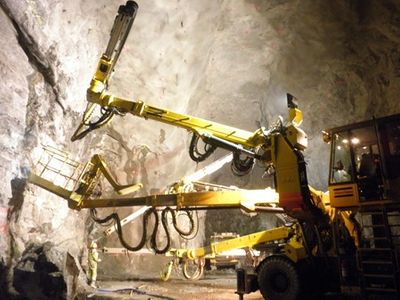- Problems in tunneling and ground behaviour
- Tunnel blasting and tunnel production with drill and blast
- Tunnel support: empirical, GRC, FEM analysis
- Excavation in sequences, principles and production aspects
- Ground water problem in tunnelling, Water ingress and Grouting
- Tunnel cost and time planning,
- Risk aspects in tunnelling,
- Sustainability in tunnelling
AF2610 Tunnel Engineering 7.5 credits

The aim of the course is to provide students with: a broad knowledge in all aspects of tunneling i.e. planning, design and construction; and deeper knowledge in four areas of tunneling: (1) excavation with drilling and blasting method, (2) design of support (3) hydrogeology, water related problems and grouting and (4) tunnel cost and time planning and risk management.
Information per course offering
Choose semester and course offering to see current information and more about the course, such as course syllabus, study period, and application information.
Course syllabus as PDF
Please note: all information from the Course syllabus is available on this page in an accessible format.
Course syllabus AF2610 (Autumn 2021–)Content and learning outcomes
Course contents
Intended learning outcomes
After the course students will be able to:
- Identify main characteristics of different ground behaviour,
- Identify and plan tunnel excavation method from technical, production, and sustainability point of view,
- Design tunnel reinforcement based on empirical, analytical and numerical assessment depending on complexity and acquire a holistic perspective on the design process,
- Analyse water ingress to tunnels and identify possible water related problems for excavation, as well as plan and implement suitable tunnel draining and/or grouting methods,
- Analyse cost and time for ordinary tunnels based on risks and construction management principles.
Literature and preparations
Specific prerequisites
Documented knowledge in foundation engineering in total 15 ECTS points corresponding to the content in courses AF1601 and AF2609.
Eng B/6 according to the Swedish upper secondary school system.
Recommended prerequisites
Documented knowledge in rock mechanics in total 7,5 ECTS points corresponding to the content in course AF2602.
Literature
Examination and completion
Grading scale
Examination
- TEN1 - Written exam, 4.5 credits, grading scale: A, B, C, D, E, FX, F
- ÖVNA - Exercises, 3.0 credits, grading scale: A, B, C, D, E, FX, F
Based on recommendation from KTH’s coordinator for disabilities, the examiner will decide how to adapt an examination for students with documented disability.
The examiner may apply another examination format when re-examining individual students.
If the course is discontinued, students may request to be examined during the following two academic years.
Ten1-examination, 4.5 hp. Grade scale: A-F
Övn1-exercises, 3.0 hp. Grade scale: P,F
Other requirements for final grade
Approved written exam
Approved exercises
Examiner
Ethical approach
- All members of a group are responsible for the group's work.
- In any assessment, every student shall honestly disclose any help received and sources used.
- In an oral assessment, every student shall be able to present and answer questions about the entire assignment and solution.